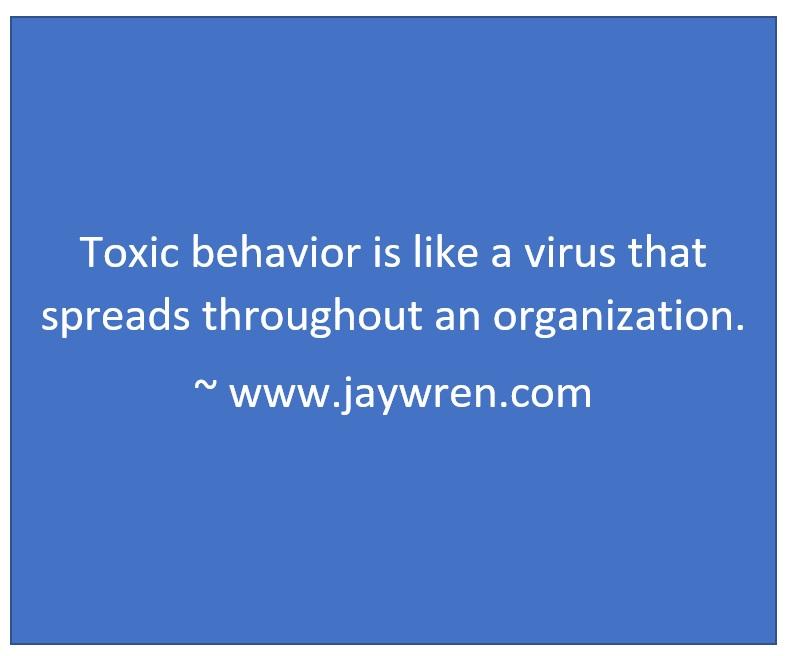Toxic Behavior: Sometimes companies develop a culture based on conflict and anger. The problem often starts at the top and works its way down and throughout an organization.
In other cases, companies hire individuals with a toxic personality. These people survive based on their performance and, at times, manage well up within the organization. They know the politics of relationships. They hide their toxic behavior from their supervisors. However, their coworkers and the people who work for them suffer.
Despite your best efforts, you may never be able to get along with these people. They have a critical, judgmental, negative personality.
The Pain of Toxic Behavior
Dreading having to work around toxic people is normal. You are not alone. Additionally, don’t blame yourself for their behavior. Blaming yourself can keep you in toxic relationships. Furthermore, no matter how well you attempt to adjust to accommodate these people, truly toxic people will not adjust to your efforts to accommodate them.
During the jobs I had in college, my service in the military, and my career in consumer products, I had over a dozen supervisors. Additionally, I have worked with dozens upon dozens of coworkers and clients.
For the most part, I have worked with good people. On the other hand, I have worked for and with some very difficult people. In most cases, I found that there was very little I could do to change the nature of my relationship with these difficult people. However, in some cases, I did find ways to improve relationships with even the most difficult people.
The Causes
In some cases, the relationship problems result from simple differences between two people. For example, you and the person with whom you have difficulties may simply have different ways of approaching work. In other instances, you may have a different way of seeing the world. You may have different values in your life and your work. A simple conflict in values can create conflicts and can sour relationships.
Abusive Behavior and Discrimination
Beyond the problem of toxic environments, regrettably, abusive behavior and job discrimination exist. Even more regrettable is that some companies ignore the problems and their employees continue to suffer. When you are a victim of abuse or when you are the target of racial, sexual, political, or religious bias, you are dealing with difficult problems.
I recommend that you speak with mentors, professionals in the areas of abuse or discrimination, and perhaps with an attorney. Biases of race, gender, politics, and religion may seem normal to the person who is biased. People see their unconscious bias as the truth, even as facts. Before you charge at the people who have harmed you, consider the issues for the long-term good of your career. Remember, you may be dealing with people who just can’t see the truth in things that don’t align with their biases. Again, I recommend that you get the best advice possible before acting.
Document Your Experience
If you are receiving abusive emails or letters from people in you company, save those documents. If you must reply to those emails, don’t respond out of anger. Make your reply factual and professional.
Make notes on a private calendar of things that happen to you. Include the date, time, and circumstances.
If your company has human resources or other professionals in place to help you, explore the possibility of discussing the issues with those people. Keep in mind that in toxic cultures the very people who are in place to help you may play roles in perpetuating the problem. Develop a relationship with these people. Get to know them. Try to learn of other issues they have resolved within the company.
Confrontation
You have personal boundaries. Everyone does. Additionally, you owe it to yourself to protect those boundaries. When possible, let people know when they are crossing those boundaries.
You should be firm but not act angry. Anger, in many cases, can only make matters worse.
In confronting the person, select a place and a time that will help you work out your issues. Perhaps, make an appointment in the person’s office. Select someplace private where you both can be candid and yet feel safe.
Until you work out your issues with the person, whenever possible, simply avoid the person.
Job Change
Workplace Relationships: Accept, Change, or End
If you believe that a job change is the answer, clarify in your mind the symptoms of toxic relationships. Make a list of your personal values. Empower yourself to make a career move that will enrich your life in your workplace relationships.
Furthermore, research as well as possible the people for whom you will be working. Ask to speak with people who are currently working at the company. Ask general questions about what they like and don’t like about the company. From these discussions, you may learn a great deal about the culture and the people around whom you will be working.
If the person who will be your supervisor is not in the interview process, ask to meet that person prior to signing on with the company.
